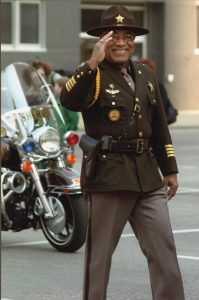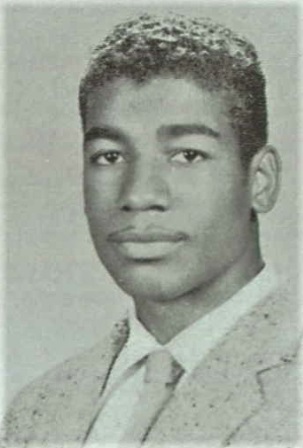
Photo info ...
(Sept. 1, 1938 – Apr. 30, 2022). Frank Anderson grew up in Indianapolis, Indiana, where he attended . He was a member of the school’s wrestling team and became an state champion. After graduating from Shortridge in 1956, Anderson enlisted in the United States Navy. He served in the Navy’s Shore Patrol until 1959.

Anderson joined the Marion County Sheriff’s Department in 1961, where he was the first Black deputy assigned to the Road Patrol division. From 1965 to 1977, he moved to the United States Marshals Service, serving as a deputy marshal and then later as an inspector and security specialist. From 1977 to 1981, Anderson served the first of two terms as U.S. marshal for the Southern District of Indiana, becoming the top federal law enforcement official for more than half the state of Indiana.
Anderson was district director for the Federal Protective Service from 1983 to 1994. In this role, he oversaw security services in federal facilities located in Indiana, Minnesota, as well as parts of Illinois and Wisconsin.
Anderson returned to the U.S. Marshals Service for the Southern District of Indiana from 1994 to 2001. During his two terms as U.S. marshal, he helped create and direct the Federal Witness Protection Program; supervised the peaceful federal government takeover of the after a months-long standoff over a tax dispute; and oversaw the execution of Timothy McVeigh, the Oklahoma City bomber, at the federal prison in Terre Haute, Indiana.
In November 2002, Anderson won election as the first Black —and the second Black sheriff in Indiana history-serving two terms (2003-2011)During his second term as sheriff, his duties expanded to include supervision of the (IMPD). General Ordinance 11, enacted on January 1, 2007, consolidated the Indianapolis Police Department with the law enforcement division of the Marion County Sheriff’s Department. As sheriff, Anderson was assigned responsibility for IMPD and appointed a chief of police. He retained control of the jail and City-County Building duties, warrants, and sex offender registry investigations, with the road patrol and investigative functions housed with IMPD.

The election of Mayor in November of 2007 reduced Anderson’s duties, resulting from Ballard’s campaign promise to consolidate all law enforcement within the . His assignments shifted to administration of the county jail, supervision of security for , tax collection, and deliverance of legal papers. By 2008, Anderson had become the only sheriff in the state of Indiana without a territory to protect.
Anderson’s supporters nominated him as a candidate in Indiana’s 2008 special election in the state’s 7th Congressional District, following the death of Congresswoman . He declined the offer and endorsed Andre Carson, Julia Carson’s grandson, who won the election.
In 2010, Anderson ran for the Democratic Party nomination for the 31st District seat in the Indiana State Senate, which he lost to Republican James W. Merritt. A few months before Anderson’s death in 2022, he published a poetry book called Lines & Rhymes.
FURTHER READING
- Tingle, Gary. “Sheriff Frank J. Anderson.” Indy.gov, July 26, 2010. https://web.archive.org/web/20101019043751/http://www.indy.gov/eGov/County/MCSD/About/Pages/sheriff.aspx.
CITE THIS ENTRY
APA:
Hillis, T. (2022). Frank J. Anderson. Encyclopedia of Indianapolis. Retrieved Feb 16, 2026, from https://indyencyclopedia.org/frank-j-anderson/.
MLA:
Hillis, Torri. “Frank J. Anderson.” Encyclopedia of Indianapolis, 2022, https://indyencyclopedia.org/frank-j-anderson/. Accessed 16 Feb 2026.
Chicago:
Hillis, Torri. “Frank J. Anderson.” Encyclopedia of Indianapolis, 2022. Accessed Feb 16, 2026. https://indyencyclopedia.org/frank-j-anderson/.

Help improve this entry
Contribute information, offer corrections, suggest images.
You can also recommend new entries related to this topic.